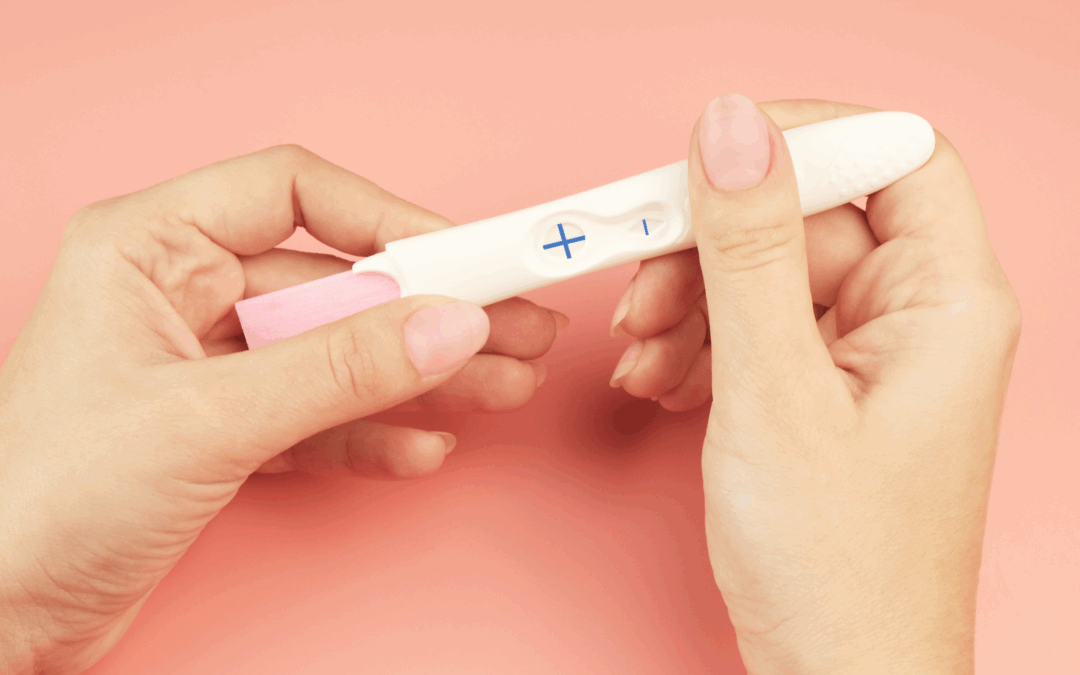Early pregnancy is a time of rapid changes, and spotting after a positive pregnancy test can be alarming. Spotting can feel scary, but it doesn’t always mean something’s wrong. We’re here to help you understand what might be happening and what steps to take next. In this blog, we explore five possible reasons for spotting during early pregnancy and what you should do next.
1. What Is Implantation Bleeding?
Implantation bleeding is a common cause of spotting after a positive pregnancy test. It occurs when the fertilized egg attaches to the uterine lining, typically 10 to 14 days after conception.[1] This light bleeding or spotting is usually pink or brown and lasts a few hours to three days.[2]
In a healthy pregnancy, implantation bleeding resolves on its own without medical intervention.[3] If you’re unsure whether your spotting is implantation bleeding, speak to your doctor as soon as possible.
2. Could It Be Vaginitis?
Vaginitis, an infection or inflammation of the vagina, can cause spotting, discharge, or irritation.[4] Hormonal changes during pregnancy may increase your risk of vaginitis, which can lead to spotting after a positive pregnancy test.[5]
Untreated vaginitis during pregnancy may increase the risk of preterm labor[6], so prompt treatment is essential. Speak to your healthcare provider about pregnancy-safe medications and treatment options.
3. Cervical Polyps and Spotting
Cervical polyps are small, benign growths on the cervix that can cause spotting after a positive pregnancy test.[7] While rare during pregnancy, they may lead to light bleeding, especially after intercourse or a pelvic exam.
Your doctor may monitor or remove polyps depending on their size, location, and your specific condition.[8] Most cervical polyps are harmless, but they may need to be tested to rule out abnormalities.
4. Understanding Molar Pregnancy
A molar pregnancy is a rare condition where a noncancerous tumor forms instead of a healthy placenta, leading to pregnancy loss.[9] Spotting or bleeding in the first trimester is a common symptom.[10]
There are two types of molar pregnancies[11]:
- Partial Molar Pregnancy: Two sperm fertilize one egg, forming an abnormal placenta and embryo that cannot survive.
- Complete Molar Pregnancy: An empty egg is fertilized, forming abnormal placental tissue with no embryo.
Thankfully, most women who receive treatment for their molar pregnancies don’t experience any further complications.[12] Your risk for future miscarriage does not increase, but you are at a slightly higher risk of another molar pregnancy.[13]
Additionally, you will need to receive regular follow-up care to monitor your risk for cancer.
5. When to Be Concerned: Miscarriage or Ectopic Pregnancy
Sometimes spotting is a sign of something more serious, like a miscarriage[14] or ectopic pregnancy.[15] It’s important to know what symptoms to look for so you can get the care you need right away.
Miscarriage symptoms may include cramping, lower back pain, or passing tissue.[16] An ectopic pregnancy occurs when a fertilized egg implants outside the uterus, often in a fallopian tube, and may cause pelvic pain, shoulder pain, or light bleeding.[17]
Ectopic pregnancies require immediate treatment, as they cannot continue and may become life-threatening if the fallopian tube ruptures.[18] Treatment options include medication (methotrexate) or surgery.[19] If you experience severe pain or heavy bleeding, seek emergency care immediately.
When to Seek Help
While spotting after a positive pregnancy test is often normal, certain symptoms may require immediate medical attention:
- Heavy bleeding or clotting
- Severe pelvic or shoulder pain
- Fever or dizziness
Contact your healthcare provider or visit the emergency room if you experience these symptoms.
Free Pregnancy Services in San Diego, California
Spotting after a positive pregnancy test? You’re not alone and you don’t have to figure it out by yourself. At CAPS, we offer free pregnancy tests, ultrasounds, and confidential support to help you feel confident about what’s next.
Contact us at (619) 337-8080 or schedule an appointment online. All services are free and confidential.
Disclaimer: This blog is here to help you learn, but it’s not a substitute for medical advice. If you’re spotting or feeling unsure, talk to your doctor or come see us for support.
This article is for informational purposes only. CAPS does not provide treatment for ectopic pregnancy, only free pregnancy tests and ultrasounds to confirm the state of your pregnancy. Upon the confirmation of the ectopic pregnancy, please meet with your primary healthcare provider as quickly as possible to receive treatment.
Sources
- Marnach, M. (2022, April 19). Is implantation bleeding common in early pregnancy?. Mayo Clinic. https://www.mayoclinic.org/healthy-lifestyle/pregnancy-week-by-week/expert-answers/implantation-bleeding/faq-20058257#
- Cleveland Clinic. (2022, December 16). Implantation Bleeding: Causes, Symptoms & What to Expect. https://my.clevelandclinic.org/health/symptoms/24536-implantation-bleeding
- See source #2.
- Cleveland Clinic. (2021, November 30). Vaginitis: Causes, Symptoms, Treatment & Prevention. https://my.clevelandclinic.org/health/diseases/9131-vaginitis
- Mayo Clinic. (2021, December 22). Vaginitis. https://www.mayoclinic.org/diseases-conditions/vaginitis/symptoms-causes/syc-20354707
- U.S. Department of Health and Human Services. (2022, February 11). Does vaginitis affect a pregnant woman & her infant?. https://www.nichd.nih.gov/health/topics/vaginitis/conditioninfo/pregnancy#
- Cleveland Clinic. (2022, November 11). Cervical Polyp: Causes, Symptoms, Diagnosis & Treatment. https://my.clevelandclinic.org/health/diseases/24436-cervical-polyp
- See source #7.
- Cleveland Clinic. (2022, November 26). Molar Pregnancy: Types, Symptoms, Causes & Treatments. https://my.clevelandclinic.org/health/diseases/17889-molar-pregnancy
- See source #9.
- See source #9.
- See source #9.
- See source #9.
- Mayo Clinic. (2023, September 8). Miscarriage. https://www.mayoclinic.org/diseases-conditions/pregnancy-loss-miscarriage/symptoms-causes/syc-20354298
- Mayo Clinic. (2022, March 12). Ectopic Pregnancy – Symptoms & Causes. https://www.mayoclinic.org/diseases-conditions/ectopic-pregnancy/symptoms-causes/syc-20372088
- See source #14.
- See source #15.
- Mayo Clinic. (2022, March 12). Ectopic Pregnancy – Diagnosis & Treatment. https://www.mayoclinic.org/diseases-conditions/ectopic-pregnancy/diagnosis-treatment/drc-20372093
- See source #18.

